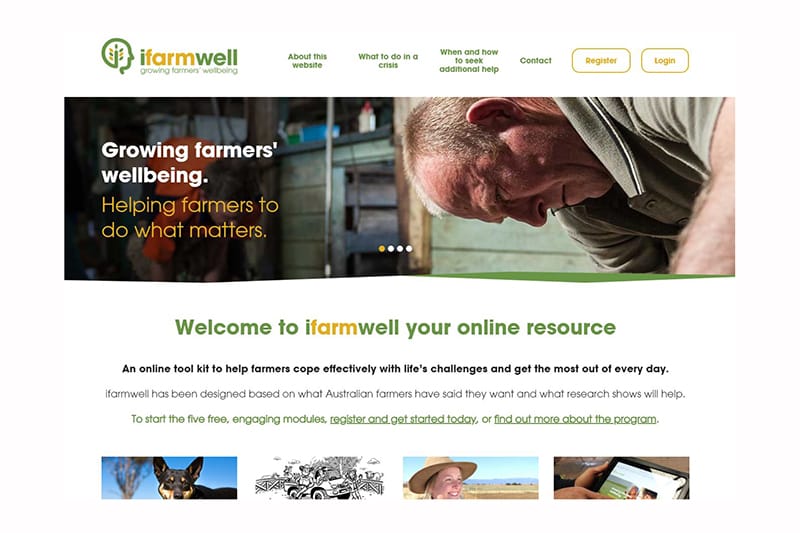06 September 2018
Online tool helps farmers cope with challenges and get the most out of every day
Online tool helps farmers cope with challenges and get the most out of every day
By Laura Griffin
06-Sept-2018
Key points
A healthy mind is key to maintaining a good farm business
Website captures farmer insights to help maintain mental health
Mental health support for farmers without the ‘fluffy stuff’
EACH year the agricultural sector contributes approximately $60 billion to the Australian economy, but farming remains one of Australia’s most physically and psychologically hazardous occupations.

Good mental health is as important as physical health, and both are as key to maintaining a farming business.
An online tool has been launched to help Australian farmers to cope effectively with life’s challenges, get the most out of every day and look after their mental health.
The tool www.ifarmwell.com.au has been developed by Australian farmers in collaboration with organisations from across the agricultural, health, mental health, university and financial sectors.
The website was launched in February and its research team is looking for primary producers across the country to trial it. This trial will help determine the website’s most helpful aspects and how it could be improved for future users.
The University of South Australia’s Research Fellow and Clinical Psychologist Dr Kate Fennell is leading the project. She said while different types of primary producers, including citrus growers, may experience different types of challenges at different times, there are many similarities in the stresses they face.
“While farmers were generally very good problem solvers, much of their stress is caused by things beyond their control such as the weather, commodity prices and disease outbreaks,” she said.
The ifarmwell research team worked closely with the farming community on the design of the website, which steps users through a series of modules to learn new ways of coping with the types of stress that farmers commonly struggle with.
“We are now looking for farmers who can help trial the ifarmwell resource and provide feedback. We plan to measure its ease of use and helpfulness and make adjustments if necessary,” Kate said.
“The ifarmwell website aims to give farmers extra coping skills and practical tips. In the first module it also provides feedback to users on their current level of wellbeing and gives them tips on how to speak to their doctor about mental health issues if they need to.”
She said potential website users should remember they do not need to be experiencing poor mental health to test the website — it has been designed to give all farmers’ new skills in coping with things beyond their control.
“To keep farmers engaged, ifarmwell also uses short videos, cartoons, jokes and text message reminders,” Kate added.
To be eligible to participate in the trial, participants must be active in a farming or pastoral enterprise in Australia, be 18 years of age or older and have access to the internet and a mobile phone.
Participants who go through all five of the modules and complete the questionnaires before and after, will have the option of being sent a $100 voucher to partly compensate them for their time and internet-related expenses.
Each module takes about 30 minutes to complete with a new module available each fortnight, giving users time to practise skills before learning new ones. It has been designed to be user-friendly across multiple devices (desktop computers, laptops, tablets and mobile devices).
Once the evaluation and revision process is complete, ifarmwell will be made available to anyone who wants to use it.
Kate said not only did farmers face a lot of volatility, but they also face barriers — including geographic and social — to using traditional health services that can put them at risk of experiencing poor wellbeing.
“A recent survey found that 49% of Australian farmers are likely to have a ‘mild or worse’ mental health disorder, compared to 26% of the general rural population, which demonstrates the specific need to address wellbeing in this group.”
She said online interventions like ifarmwell may help to overcome some of these barriers, but it was not designed to replace traditional mental health services. She said it was an additional self-help tool which will provide a way for farmers to develop new coping strategies and hopefully prevent the development of mental health issues and the need for professional help.
The strategies explained on the website are designed to be applied to all challenges farmers (or anyone for that matter) face. Where possible the examples given, and metaphors used to explain key concepts are farming related and the images for each user are tailored to their farming type (e.g. dairy, sheep, viticulture, horticulture) so that the website is as relevant as possible to each user.
Eighteen farmers from across Australia participated in the development of the website.
“They provided great insights into the things that they thought were important to consider when designing a website for farmers’ health and wellbeing, such as the language used, colours, images and technical features. An example of this is they said to make sure the language is ‘not too fluffy!’” Kate said.
She said when farmers login they are required to give their first name, email address and phone number, so the website can call them by the correct
name; and they can receive the text message reminders and messages of support.
ACKNOWLEDGEMENT
The ifarmwell research team also includes Associate Professor Jim Dollman, Professor Deborah Turnbull, Dr Andrew Vincent, Professor Susan Brumby, Dr Camille Short, Alison Barrett and Nathan Harrison. It is supported by the NAB Foundation (which committed $100,000 to the project), the Freemasons Foundation Centre for Men’s Health, the Freemasons Foundation, the University of Adelaide, the National Centre for Farmer Health and Livestock SA.
Membership
You are not logged in
If you are not already a member, please show your support and join Citrus Australia today. Collectively we can make big things happen.
